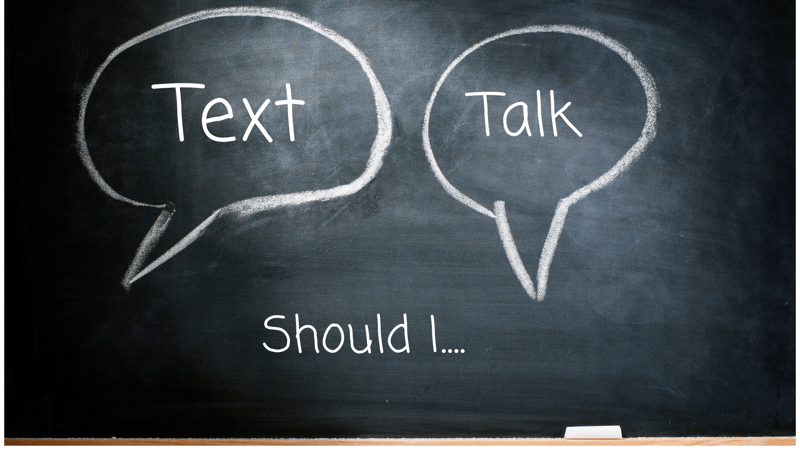Perhaps the most important skill in sales is understanding how to communicate with your customers. Through communication, you build trust and understanding with your customers.
Strong communication skills give your customers clarity and confidence in what they are buying. Your customers want clarity and confidence in what they are buying. Do that on a regular basis and they'll remain loyal for years to come.
Talk or text? Know customer's preferred method of communication

For years, in-person and telephone conversations were pretty much the only means of talking directly with your customers. In truth, many if not most customers still prefer these methods. However, there is a major shift for the young generation.
Five years ago, a study stated that as many as 75% of millennials prefer texting over in-person and phone conversations. Whether that number remains true, it is important for your sales team to be proficient at texting rather than simply talking to a customer.
That doesn't mean you should go all-in on texting for every millennial interested. There's a fine line every dealership must walk to discover how each customer likes to communicate.
When you make first contact, it's worth asking what the customer's preferred method of communication is. Then, handle as much business as possible through that means.
Tips for Talking

No matter what form of communication your customer prefers, there is a likely chance that you will meet your customer and talk to them in person before a sale is completed. So, all salespeople must be proficient in face-to-face conversation, despite the availability of texting and email.
One of the most important tips for dealership sales teams is listening. Listening is not merely letting the customer talk. A good salesperson listens by:
- Confirming with the customer that you fully understand them
- Ask follow-up questions relevant to understand the customer's wants, needs and values
- Be empathetic to the customer's concerns and their challenges
- Be okay with a few seconds of silence during a conversation to allow time for a customer to finish a thought without interrupting them
Just as important as your listening skills, when you talk, your customers should believe you are honest, caring and an authority on your subject.
- Control the tone of your voice and how fast you speak to closely mirror your customer's
- Be specific in each point you make; give real examples that support your points
- Know as much as possible, but be honest about what you do not know
- Do not make assumptions about your customer's intentions or situation
Tips for Texting

Believe it or not, a customer is more likely to read a text message from a salesperson than an e-mail, according to Hubspot. However, if your customer is texting you, they may also be texting one of your competitors at the same time. So, it's important to make each text count.
It is important to note that cold texting a potential customer is illegal. A customer must first opt-in to receiving texts from you. This can be done through:
- Encouraging a prospect to text a keyword to a mobile number to open communication
- Have a communication consent box on your online inquiry form where a customer can opt-in for texting
- Run a promotion where opting-in for texting is part of the terms of the promotion
Here are some tips to effectively text your customer
- Your first text should be a confirmation to the customer that they have reached out to your business. The first text should also include language explaining how they can stop receiving texts.
- Have a discovery phone with your customer before texting. You will be able to understand who your customer is much better and determine what their needs are. During the discovery phone call, ask the customer verbally if they are okay with receiving texts from you.
- Each text should be short and have a specific purpose including:
- Checking if they are available for a meeting
- Confirming a call or meeting with you
- Answering a simple question
- Giving a resource to help them in their buyer's journey
- Walk the line between being professional and friendly. If you're either too professional or too casual, you may lose your customer's trust. Keep it conversational without using slang or emojis
- Only text during business hours. If you text outside of business hours, your customer may think you are invading their privacy
Conclusion
The proficiency of your dealership's sales team to communicate directly influences how much your prospects and customers trust you. With trust - and profits - at stake, training your team to be effective communicators in both texting and in-person conversations is imperative to your success.
Make sure they practice their skills and continue to sharpen and refine their skills to meet the different needs of the variety of customers you will encounter.
If you're interested in improving your sales team's efficiency, schedule a call with EverLogic to learn about the tools we have for your dealership's sales department.
July 11, 2022
